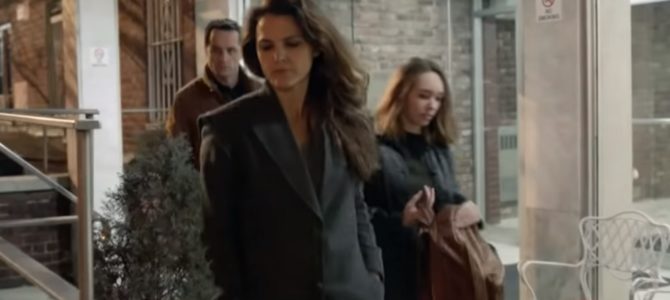
Major spoilers included.
After six seasons, fan favorite spy series “The Americans” came to a close last night. Whenever a beloved, highly acclaimed series ends, pressure on the creators for a strong finale is high. This episode, aptly titled “START,” was almost as good as it gets.
There were no major deaths, no huge plot twists, but instead a gut-wrenching dismantling of a family who, despite their flaws, were deeply devoted to each other. The conclusion of the final season explored the ever-complicated relationships between the Jennings and the life they were no longer able to live. They may have been Soviet spies and ruthless killers, but they were also parents who loved their children, and good friends and employers.
Through all six seasons, showrunner Joe Weisburg, a former CIA operative, has delivered riveting, textured, and beautifully written television. At times scary, thrilling, heart-breaking, and cringe-worthy, “The Americans” delivered one of the best-crafted sagas in television history. Each character was mapped out to the finest detail, and every shot was full of story-driving purpose.
The show was loosely based on a ring of Russian spies living as American citizens during the 1990s and early 2000s. After the 10 spies were discovered in 2010, arrested, and exchanged for prisoners in Russia, it became public knowledge that many had children who were born and raised in the United States or Canada, and were now living in Russia. The strain and disappointment of one family who had been living in New Jersey was covered extensively by the Wall Street Journal in 2012.
The Suspicion Comes Full Circle
At the beginning of the series, Stan Beeman, a competent agent and all around stand-up guy, became somewhat suspicious of his neighbors due to their odd hours and empty past. He explored the possibility of them being something other than what they appeared to be, but ultimately let it go, assuring himself that he was being paranoid. The Jennings continued their double lives for the next six seasons, evoking not one more question about their behavior from their FBI neighbor, instead nurturing their friendly relationship with him.
Not until the final few episodes of the series did the light bulb in Stan’s brain slowly flicker back to life. After years of confidently assessing that their neighbor was not looking at them suspiciously, Elizabeth and Philip mysteriously abandoned their son on Thanksgiving, while Stan was investigating a recently discovered “illegal” in Chicago.
Finally, Stan was unable to ignore the evidence that pointed to his beloved neighbors being much more than ambitious travel agents, and he became obsessed. After being rebuked at work with his suggestion that his neighbors were Soviet spies, Stan takes it upon himself to surveil them. This time, he will not be deterred.
Beeman confronts his one-time friends in the parking garage of their daughter’s apartment, as they are about to flee in a stolen car. Peter and Elizabeth turn on their best undercover deceit mode, but Stan will not be swayed. He has caught them now.
He levels his gun at them, and lays out all the ways this discovery hurts him and how many people have died at the hands of the Soviets. For minutes that seem to last for hours, Beeman and the Jennings go back and forth with excuses and explanations, Philip pleading for their freedom, and assuring Stan that their bond had always been real. They confess almost everything, only leaving out the murders, pressing hard that they only did what they did for their country, a country that they no longer trust.
Without dramatic music, and without any explosive moment, we watched with bated breath, wondering what Beeman would choose to be: Philip Jenning’s best friend, or an FBI agent. Ultimately, he lets them go, and now must become a deceiver like them to cover his choice. This scene had enough power to be the entire finale, all on its own.
Time to Live With the Truth of Their Choices
Beeman returns to the FBI headquarters with the haunting anthem “Brothers in Arms” by the Dire Straits accurately assessing the emotional tone of the previous scene, and his subsequent reality. The priest Philip had been seen with has finished giving descriptions to the sketch artist, and Stan is told that he was right: The Jennings were, in fact, Soviet spies.
Of course, Stan knows this. He knows right where he left them and that the teams sent to watch their homes and business will not find them. Noah Emmerich, who portrays Stan, has always been a rock-solid performer on the show, but the finale found another gear for him, one in which his mostly stoic face told the story of his deep conflict. He knew his decision to let the Jennings escape was undoable, and that he would never tell the truth, but he would always live with whether he did the right thing.
Meanwhile the Jennings, who knew already they would have to leave their teen son behind, grappled with truly leaving the only home they could really remember, and that they have no choice. Philip contemplates staying behind in hiding, hoping to make occasional contact with their son, but ultimately decides that isn’t realistic.
Daughter Paige, portrayed by a suddenly brilliant Holly Taylor, is too emotional to even speak to her brother on the phone. They quietly don disguises, morosely rehearse their plans, and begin the journey back to the Soviet Union, where they are unsure they will be received as warmly as they hope. Paige is ultimately unable to cross the border into Canada with her parents.
A brilliantly selected “With or Without You” by U2 hauntingly takes over the scene as Paige walks away from her family on the train platform. She knows she belongs in America, near her brother. Without assessing what she’ll do on her own, she leaves her parents to return to an empty apartment, and a bottle of vodka.
As the leads, Keri Russell and Matthew Rhys have consistently turned in mesmerizing performances. In this finale, they reached their peak. Stifling worry and panic through the whole series, only when their daughter leaves them at the train station does anguish flood into their faces. They can only feel what they’ve been trained to feel as operatives after she’s gone. They know they can’t go after her, but it kills them inside.
Now with only each other, Philip and Elizabeth know they must press on. Their life as they’ve known it is now over, and their only hope for a future is in the motherland they can barely remember.
Back in Russia, they quietly observe the bleak, grey landscape, and as their car slowly crosses endless frozen terrain, they think of their children. Stopping on a bridge, they exit the car, and look into the distance of their unfamiliar home and accept their reality. The children they raised and loved for every minute of their lives are now separated from them, probably forever—but this was the life they signed up for. “We’ll get used to it.”









